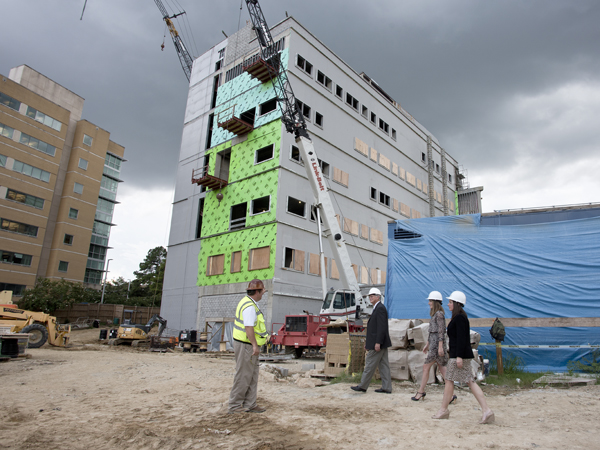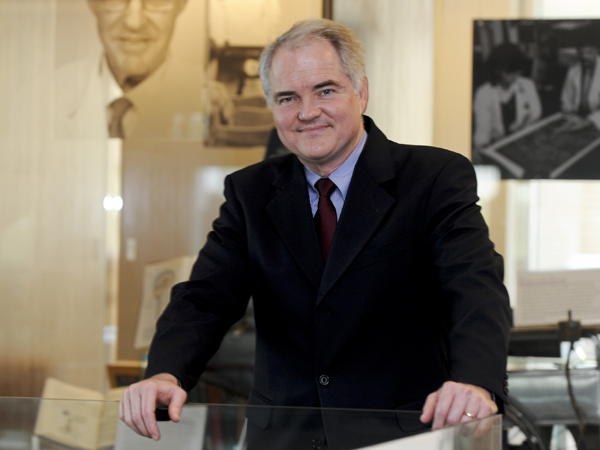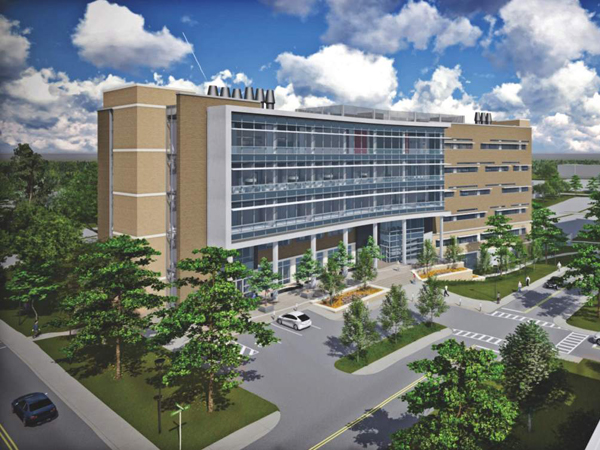Big problem, bigger award: NIH funds UMMC obesity research

The University of Mississippi Medical Center has received its largest single award ever to confront one of the state's largest health issues.
The five-year, $19.9 million award from the National Institutes of Health will fund the Mississippi Center for Clinical and Translational Research (CCTR.) Supported by the NIH's Institutional Development Award (IDeA) program, the CCTR's mission will be the prevention, diagnosis and treatment of obesity and related health conditions.
“Mississippi has the highest rate of obesity in the United States,” said Dr. James Wilson, professor of physiology and biophysics and the project's lead investigator. The Centers for Disease Control and Prevention reports that 35 percent of Mississippi adults are obese.

To address the problem, UMMC scientists and health-care professionals need an approach that brings their research from the laboratory bench to the greater population.
“Translational research takes basic science findings and uses them to develop interventions that will affect treatment options and public health,” Wilson said. Example interventions could be community engagement programs or pharmaceutical drugs.
The new award, announced by the office of U.S. Sen. Thad Cochran, enhances UMMC's capability to conduct clinical and translational research. The CCTR's task is to invest in people who will make those solutions a reality.
“A significant mission of the program will be to train junior faculty into established investigators,” Wilson said.
That training will come through CCTR's Professional Development Core, whose members will mentor junior faculty conducting obesity-related research. In addition, the Pilot Projects Program will fund promising projects while the researchers seek additional outside funding to sustain their activities.

Dr. Richard Summers, UMMC associate vice chancellor for research, emphasized the importance of developing new talent to spur obesity-related clinical research - a theme present throughout UMMC's history.
“When the Medical Center was built in 1955, most of the faculty who formed our early clinical research programs were young investigators,” Summers said. Organ transplant pioneer Dr. James Hardy was 37 in 1955; cardiovascular physiologist Dr. Arthur Guyton was 36.
“With the CCTR, our goal is to build a pipeline of investigators and clinical research for years to come,” Summers said.
Dr. Jeffrey Vitter, University of Mississippi chancellor, thanked Cochran for championing health sciences research and extended his congratulations to the research team at the Medical Center.
“We are honored by this NIH investment to substantially enhance our capacity and success in translating research discoveries and innovations to better health outcomes,” Vitter said.
UMMC has a reputation for strong basic research on cardiovascular function and disease, Wilson said. This will provide a starting point for creating clinical applications.
In recent years, UMMC has built the infrastructure needed to advance its clinical and translational research capabilities. The Center for Bioinformatics and Biostatistics, Enterprise Data Warehouse and Clinical Research Support Program are three important parts, Wilson and Summers said. When two campus construction projects - one nearly complete and the other in the planning stages - wrap up, UMMC will have a full set of physical tools needed to achieve these goals.
“The timing of this magnificent grant couldn't be better as it coincides with the development of our Translational Research Center and Clinical Research Unit in the University Hospital, facilities that will be crucial to our success in clinical and translational research,” said Dr. LouAnn Woodward, UMMC vice chancellor for health affairs.

“We look forward to putting these assets to work in the cause of discovering tomorrow's treatments and cures,” Woodward said.
“All of these pieces brought together give UMMC the infrastructure to enhance clinical research,” Summers said.
However, UMMC cannot solve the obesity epidemic in Mississippi on its own. Tougaloo College and the University of Southern Mississippi will also collaborate in the CCTR.
“Those institutions will be key in community outreach efforts,” Wilson said.
The CCTR will also pursue extensive collaborations with two NIH-funded clinical and translational -research centers. Pennington Biomedical Research Center in Baton Rouge, La., has expertise in nutrition and metabolic disease, valuable to UMMC's obesity efforts, Wilson said.
The other center is based at the Mayo Clinic in Rochester, Minn. UMMC and Mayo entered into a collaborative agreement in 2014 that allows the institutions to share data tools and trial participants. Close ties have already developed around cancer research.
The National Institute for General Medical Sciences funds IDeA awards, which support biomedical research programs in states with limited history of federal funding. The Clinical and Translational Research program enhances research on health issues impacting medically underserved populations and health concerns specific to those states.
Wilson said that after five years, “We hope to have ten or more junior investigators successfully funded as a direct result of this grant” and on a trajectory to independent obesity research programs. In addition, other CCTR core infrastructure such as regulatory, logistics, epidemiological and evaluation support will be operating.
“As an additional result, we hope to recruit senior-level population and clinical investigators with the ability to collaborate with each other,” Wilson said.
Summers said he is “very proud of Wilson and his efforts so far.” Now, he looks forward to the future.
“This award has the potential to be transformational for us,” Summers said.


